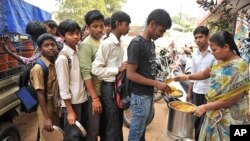India says there has been a record decline in poverty levels in the country over five years. However, the reduction is based on a controversial benchmark, which social activists say has simply lowered the bar for counting the poor.
India’s Planning Commission says poverty levels in the country plummeted by more than seven percent from 2005 to 2010.
Officials counted nearly 30 percent of the population as being among the poor in 2009-2010 compared to more than 37 percent in 2005.
India's vast rural areas, where two thirds of the population lives, saw a sharper decline in poverty compared to urban areas, according to the new data. Officials attribute the drop to higher spending on rural welfare programs in recent years.
But the new estimates have re-ignited controversy surrounding how India is counting its poor. Last year, the planning commission set new poverty guidelines with only those living on less than 60 cents a day in urban areas and 50 cents a day in rural areas now considered to be destitute.
Critics have slammed this benchmark as unrealistic, saying it is impossible to have access to food, health care and education on this amount.
On Tuesday, opposition members in the upper house of parliament called the new benchmark a "starvation line" and a ploy to "deceive the poor."
Professor of economics at Jawaharlal Nehru University, Himanshu says the new norms should not be used to exclude millions of poor people from welfare programs.
"We may say it is a starvation line," said Himanshu. "We also agree that it is a destitution line. But as long as it is only used as a yardstick of measuring progress over time, I have no problems. But I do have a problem when you use this poverty line to restrict benefits of certain basic entitlements of people in this country. That definitely is a cause of worry."
The new poverty estimates peg the number of poor Indians at 360 million. The figure is far lower than World Bank estimates, which uses a measure of $2 a day and puts the number of poor in India at 828 million.
Development specialists say whatever measurement is used, there is little doubt that India faces a stiff challenge in lifting millions of people out of poverty, despite its recent economic boom.
New estimates also show that some parts of the country are not making progress in cutting poverty. The country’s remote northeastern states and populous underdeveloped states such as Uttar Pradesh saw an increase in the number of poor, according to the latest survey.
Economist Himanshu says the huge level of variation in poverty reduction is a cause of worry.
"That is going to basically raise inequalities to a completely new dimension. Some of these are also states that have been going through a problem of internal security," said Himanshu.
News
India Claims Sharp Drop in Poverty




